- Home
- Gerald Durrell
My Family and Other Animals Page 2
My Family and Other Animals Read online
Page 2
1
The Unsuspected Isle
We threaded our way out of the noise and confusion of the customs shed into the brilliant sunshine on the quay. Around us the town rose steeply, tiers of multi-coloured houses piled haphazardly, green shutters folded back from their windows like the wings of a thousand moths. Behind us lay the bay, smooth as a plate, smouldering with that unbelievable blue.
Larry walked swiftly, with head thrown back and an expression of such regal disdain on his face that one did not notice his diminutive size, keeping a wary eye on the porters who struggled with his trunks. Behind him strolled Leslie, short, stocky, with an air of quiet belligerence, and then Margo, trailing yards of muslin and scent. Mother, looking like a tiny, harassed missionary in an uprising, was dragged unwillingly to the nearest lamp post by an exuberant Roger and forced to stand there, staring into space, while he relieved the pent-up feelings that had accumulated in his kennel. Larry chose two magnificently dilapidated horse-drawn cabs, had the luggage installed in one and seated himself in the second. Then he looked round irritably.
‘Well?’ he asked. ‘What are we waiting for?’
‘We’re waiting for Mother,’ explained Leslie. ‘Roger’s found a lamp post.’
‘Dear God!’ said Larry, and then hoisted himself upright in the cab and bellowed, ‘Come on, Mother, come on. Can’t the dog wait?’
‘Coming, dear,’ called Mother passively and untruthfully, for Roger showed no signs of quitting the post.
‘That dog’s been a damned nuisance all the way,’ said Larry.
‘Don’t be so impatient,’ said Margo indignantly; ‘the dog can’t help it… and anyway, we had to wait an hour in Naples for you.’
‘My stomach was out of order,’ explained Larry coldly.
‘Well, probably his stomach’s out of order,’ said Margo triumphantly. ‘It’s six of one and a dozen of the other.’
‘You mean half a dozen of the other.’
‘Whatever I mean, it’s the same thing.’
At this moment Mother arrived, slightly dishevelled, and we had to turn our attentions to the task of getting Roger into the cab. He had never been in such a vehicle, and treated it with suspicion. Eventually we had to lift him bodily and hurl him inside, yelping frantically, and then pile in breathlessly after him and hold him down. The horse, frightened by this activity, broke into a shambling trot, and we ended in a tangled heap on the floor of the cab with Roger moaning loudly underneath us.
‘What an entry,’ said Larry bitterly. ‘I had hoped to give an impression of gracious majesty, and this is what happens… we arrive in town like a troupe of mediæval tumblers.’
‘Don’t keep on, dear,’ Mother said soothingly, straightening her hat; ‘we’ll soon be at the hotel.’
So our cab clopped and jingled its way into the town, while we sat on the horsehair seats and tried to muster the appearance of gracious majesty Larry required. Roger, wrapped in Leslie’s powerful grasp, lolled his head over the side of the vehicle and rolled his eyes as though at his last gasp. Then we rattled past an alley-way in which four scruffy mongrels were lying in the sun. Roger stiffened, glared at them, and let forth a torrent of deep barks. The mongrels were immediately galvanized into activity, and they sped after the cab, yapping vociferously. Our pose was irretrievably shattered, for it took two people to restrain the raving Roger, while the rest of us leaned out of the cab and made wild gestures with magazines and books at the pursuing horde. This only had the effect of exciting them still further, and at each alley-way we passed their numbers increased, until by the time we were rolling down the main thoroughfare of the town there were some twenty-four dogs swirling about our wheels, almost hysterical with anger.
‘Why doesn’t somebody do something?’ asked Larry, raising his voice above the uproar. ‘This is like a scene from Uncle Tom’s Cabin.’
‘Why don’t you do something; instead of criticizing?’ snapped Leslie, who was locked in combat with Roger.
Larry promptly rose to his feet, snatched the whip from our astonished driver’s hand, made a wild swipe at the herd of dogs, missed them, and caught Leslie across the back of the neck.
‘What the hell d’you think you’re playing at?’ Leslie snarled, twisting a scarlet and angry face towards Larry.
‘Accident,’ explained Larry airily. ‘I’m out of practice… it’s so long since I used a horse whip.’
‘Well, watch what you’re bloody well doing,’ said Leslie loudly and belligerently.
‘Now, now, dear, it was an accident,’ said Mother.
Larry took another swipe at the dogs and knocked off Mother’s hat.
‘You’re more trouble than the dogs,’ said Margo.
‘Do be careful, dear,’ said Mother, clutching her hat; ‘you might hurt someone. I should put the whip down.’
At that moment the cab shambled to a halt outside a doorway over which hung a board with ‘Pension Suisse’ inscribed on it. The dogs, feeling that they were at last going to get to grips with this effeminate black canine who rode in cabs, surrounded us in a solid, panting wedge. The door of the hotel opened and an ancient bewhiskered porter appeared and stood staring glassily at the turmoil in the street. The difficulties of getting Roger out of the cab and into the hotel were considerable, for he was a heavy dog and it took the combined efforts of the family to lift, carry, and restrain him. Larry had by now forgotten his majestic pose and was rather enjoying himself. He leaped down and danced about the pavement with the whip, cleaving a path through the dogs, along which Leslie, Margo, Mother, and I hurried, bearing the struggling, snarling Roger. We staggered into the hall, and the porter slammed the front door and leaned against it, his moustache quivering. The manager came forward, eyeing us with a mixture of apprehension and curiosity. Mother faced him, hat on one side of her head, clutching in one hand my jam jar of caterpillars.
‘Ah!’ she said, smiling sweetly, as though our arrival had been the most normal thing in the world. ‘Our name’s Durrell. I believe you’ve got some rooms booked for us?’
‘Yes, madame,’ said the manager, edging round the still grumbling Roger; ‘they are on the first floor… four rooms and a balcony.’
‘How nice,’ beamed Mother; ‘then I think we’ll go straight up and have a little rest before lunch.’
And with considerable majestic graciousness she led her family upstairs.
Later we descended to lunch in a large and gloomy room full of dusty potted palms and contorted statuary. We were served by the bewhiskered porter, who had become the head waiter simply by donning tails and a celluloid dicky that creaked like a convention of crickets. The meal, however, was ample and well cooked, and we ate hungrily. As coffee was served, Larry sat back in his chair with a sigh.
‘That was a passable meal,’ he said generously. ‘What do you think of this place, Mother?’
‘Well, the food’s all right, dear,’ said Mother, refusing to commit herself.
‘They seem a helpful crowd,’ Larry went on. ‘The manager himself shifted my bed nearer the window.’
‘He wasn’t very helpful when I asked for paper,’ said Leslie.
‘Paper?’ asked Mother. ‘What did you want paper for?’
‘For the lavatory…there wasn’t any in there,’ explained Leslie.
‘Shhh! Not at the table,’ whispered Mother.
‘You obviously don’t look,’ said Margo in a clear and penetrating voice; ‘they’ve got a little box full by the pan.’
‘Margo, dear!’ exclaimed Mother, horrified.
‘What’s the matter? Didn’t you see the little box?’
Larry gave a snort of laughter.
‘Owing to the somewhat eccentric plumbing system of the town,’ he explained to Margo kindly, ‘that little box is provided for the… er… debris, as it were, when you have finished communing with nature.’
Margo’s face turned scarlet with a mixture of embarrassment and disgust.
‘You mea
n… you mean… that was… My God! I might have caught some foul disease,’ she wailed, and, bursting into tears, fled from the dining-room.
‘Most insanitary,’ said Mother severely; ‘it really is a disgusting way to do things. Quite apart from the mistakes one can make, I should think there’s a danger of getting typhoid.’
‘Mistakes wouldn’t happen if they’d organize things properly,’ Leslie pointed out, returning to his original complaint.
‘Yes, dear; but I don’t think we ought to discuss it now. The best thing we can do is to find a house as soon as possible, before we all go down with something.’
Upstairs Margo was in a state of semi-nudity, splashing disinfectant over herself in quantities, and Mother spent an exhausting afternoon being forced to examine her at intervals for the symptoms of the diseases which Margo felt sure she was hatching. It was unfortunate for Mother’s peace of mind that the Pension Suisse happened to be situated in the road leading to the local cemetery. As we sat on our small balcony overhanging the street an apparently endless succession of funerals passed beneath us. The inhabitants of Corfu obviously believed that the best part of a bereavement was the funeral, for each seemed more ornate than the last. Cabs decorated with yards of purple and black crêpe were drawn by horses so enveloped in plumes and canopies that it was a wonder they could move. Six or seven of these cabs, containing the mourners in full and uninhibited grief, preceded the corpse itself. This came on another cartlike vehicle, and was ensconced in a coffin so large and lush that it looked more like an enormous birthday cake. Some were white, with purple, black-and-scarlet, and deep blue decorations; others were gleaming black with complicated filigrees of gold and silver twining abundantly over them, and glittering brass handles. I had never seen anything so colourful and attractive. This, I decided, was really the way to die, with shrouded horses, acres of flowers, and a horde of most satisfactorily grief-stricken relatives. I hung over the balcony rail watching the coffins pass beneath, absorbed and fascinated.
As each funeral passed, and the sounds of mourning and the clopping of hooves died away in the distance, Mother became more and more agitated.
‘I’m sure it’s an epidemic,’ she exclaimed at last, peering down nervously into the street.
‘Nonsense, Mother; don’t fuss,’ said Larry airily.
‘But, dear, so many of them… it’s unnatural.’
‘There’s nothing unnatural about dying. People do it all the time.’
‘Yes, but they don’t die like flies unless there’s something wrong.’
‘Perhaps they save ’em up and bury ’em in a bunch,’ suggested Leslie callously.
‘Don’t be silly,’ said Mother. ‘I’m sure it’s something to do with the drains. It can’t be healthy for people to have those sort of arrangements.’
‘My God!’ said Margo sepulchrally, ‘then I suppose I’ll get it.’
‘No, no, dear; it doesn’t follow,’ said Mother vaguely; ‘it might be something that’s not catching.’
‘I don’t see how you can have an epidemic unless it’s something catching,’ Leslie remarked logically.
‘Anyway,’ said Mother, refusing to be drawn into any medical arguments, ‘I think we ought to find out. Can’t you ring up the health authorities, Larry?’
‘There probably aren’t any health authorities here,’ Larry pointed out, ‘and even if there were, I doubt if they’d tell me.’
‘Well,’ Mother said with determination, ‘there’s nothing for it. We’ll have to move. We must get out of the town. We must find a house in the country at once.’
The next morning we started on our house-hunt, accompanied by Mr Beeler, the hotel guide. He was a fat little man with cringing eyes and sweat-polished jowls. He was quite sprightly when we set off, but then he did not know what was in store for him. No one who has not been house-hunting with my mother can possibly imagine it. We drove around the island in a cloud of dust while Mr Beeler showed us villa after villa in a bewildering selection of sizes, colours, and situations, and Mother shook her head firmly at them all. At last we had contemplated the tenth and final villa on Mr Beeler’s list, and Mother had shaken her head once again. Brokenly Mr Beeler seated himself on the stairs and mopped his face with his handkerchief.
‘Madame Durrell,’ he said at last, ‘I have shown you every villa I know, yet you do not want any. Madame, what is it you require? What is the matter with these villas?’
Mother regarded him with astonishment.
‘Didn’t you notice?’ she asked. ‘None of them had a bathroom.’
Mr Beeler stared at Mother with bulging eyes.
‘But Madame,’ he wailed in genuine anguish, ‘what for you want a bathroom? Have you not got the sea?’
We returned in silence to the hotel.
By the following morning Mother had decided that we would hire a car and go out house-hunting on our own. She was convinced that somewhere on the island there lurked a villa with a bathroom. We did not share Mother’s belief, and so it was a slightly irritable and argumentative group that she herded down to the taxi rank in the main square. The taxi drivers, perceiving our innocent appearance, scrambled from inside their cars and flocked round us like vultures, each trying to out-shout his compatriots. Their voices grew louder and louder, their eyes flashed, they clutched each other’s arms and ground their teeth at one another, and then they laid hold of us as though they would tear us apart. Actually, we were being treated to the mildest of mild altercations, but we were not used to the Greek temperament, and to us it looked as though we were in danger of our lives.
‘Can’t you do something, Larry?’ Mother squeaked, disentangling herself with difficulty from the grasp of a large driver.
‘Tell them you’ll report them to the British consul,’ suggested Larry, raising his voice above the noise.
‘Don’t be silly, dear,’ said Mother breathlessly. ‘Just explain that we don’t understand.’
Margo, simpering, stepped into the breach.
‘We English,’ she yelled at the gesticulating drivers; ‘we no understand Greek.’
‘If that man pushes me again I’ll poke him in the eye,’ said Leslie, his face flushed red.
‘Now, now, dear,’ panted Mother, still struggling with the driver who was propelling her vigorously towards his car; ‘I don’t think they mean any harm.’
At that moment everyone was startled into silence by a voice that rumbled out above the uproar, a deep, rich, vibrant voice, the sort of voice you would expect a volcano to have.
‘Hoy!’ roared the voice. ‘Whys donts yous have someones who can talks your own language?’
Turning, we saw an ancient Dodge parked by the curb, and behind the wheel sat a short, barrel-bodied individual, with hamlike hands and a great, leathery, scowling face surmounted by a jauntily tilted peaked cap. He opened the door of the car, surged out onto the pavement, and waddled across to us. Then he stopped, scowling even more ferociously, and surveyed the group of silent cab drivers.
‘Thems been worrying yous?’ he asked Mother.
‘No, no,’ said Mother untruthfully; ‘it was just that we had difficulty in understanding them.’
‘Yous wants someones who can talks your own language,’ repeated the new arrival; ‘thems bastards… if yous will excuses the words… would swindles their own mothers. Excuses me a minute and I’ll fix thems.’
He turned on the drivers a blast of Greek that almost swept them off their feet. Aggrieved, gesticulating, angry, they were herded back to their cars by this extraordinary man. Having given them a final and, it appeared, derogatory blast of Greek, he turned to us again.
‘Wheres yous wants to gos?’ he asked, almost truculently.
‘Can you take us to look for a villa?’ asked Larry.
‘Sure. I’ll takes yous anywheres. Just yous says.’
‘We are looking,’ said Mother firmly, ‘for a villa with a bathroom. Do you know of one?’
The man brooded
like a great, suntanned gargoyle, his black eyebrows twisted into a knot of thoughtfulness.
‘Bathrooms?’ he said. ‘Yous wants a bathrooms?’
‘None of the ones we have seen so far had them,’ said Mother.
‘Oh, I knows a villa with a bathrooms,’ said the man. ‘I was wondering if its was goings to be bigs enough for yous.’
‘Will you take us to look at it, please?’ asked Mother.
‘Sure, I’ll takes yous. Gets into the cars.’
We climbed into the spacious car, and our driver hoisted his bulk behind the steering wheel and engaged his gears with a terrifying sound. We shot through the twisted streets on the outskirts of the town, swerving in and out among the loaded donkeys, the carts, the groups of peasant women, and innumerable dogs, our horn honking a deafening warning. During this our driver seized the opportunity to engage us in conversation. Each time he addressed us he would crane his massive head round to see our reactions, and the car would swoop back and forth across the road like a drunken swallow.
‘Yous English? Thought so… English always wants bathrooms… I gets a bathroom in my house… Spiro’s my name, Spiro Hakiaopulos… they alls calls me Spiro Americano on accounts of I lives in America… Yes, spent eight years in Chicago… That’s where I learnt my goods English… Wents there to makes moneys… Then after eight years I says, “Spiros,” I says, “yous mades enough…” sos I comes backs to Greece… brings this car… best ons the islands… no one else gets a car like this… All the English tourists knows me, theys all asks for me when theys comes here… Theys knows theys wonts be swindled… I likes the English… best kinds of peoples… Honest to Gods, ifs I wasn’t Greek I’d likes to be English.’
We sped down a white road covered in a thick layer of silky dust that rose in a boiling cloud behind us, a road lined with prickly pears like a fence of green plates each cleverly balanced on another’s edge, and splashed with knobs of scarlet fruit. We passed vineyards where the tiny, stunted vines were laced in green leaves, olive groves where the pitted trunks made a hundred astonished faces at us out of the gloom of their own shadow, and great clumps of zebra-striped cane that fluttered their leaves like a multitude of green flags. At last we roared to the top of a hill, and Spiro crammed on his brakes and brought the car to a dust-misted halt.

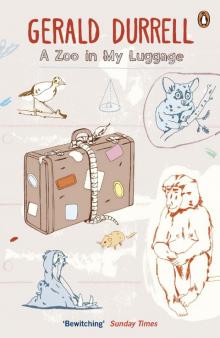 A Zoo in My Luggage
A Zoo in My Luggage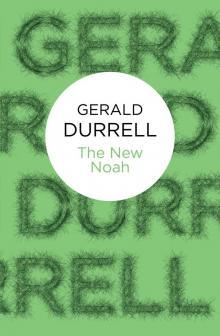 The New Noah
The New Noah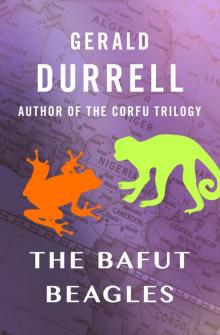 The Bafut Beagles
The Bafut Beagles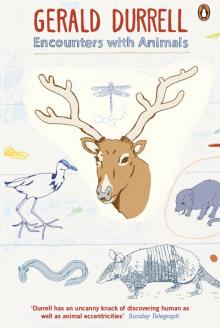 Encounters With Animals
Encounters With Animals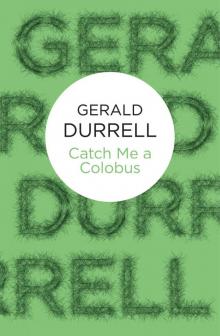 Catch Me a Colobus
Catch Me a Colobus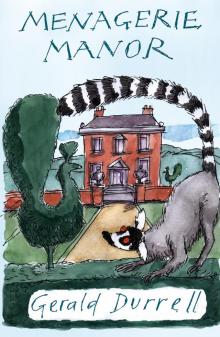 Menagerie Manor
Menagerie Manor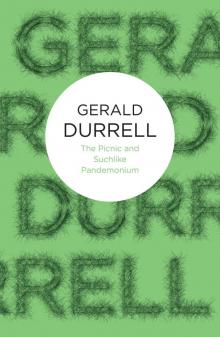 The Picnic and Suchlike Pandemonium
The Picnic and Suchlike Pandemonium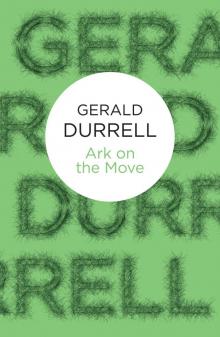 Ark on the Move
Ark on the Move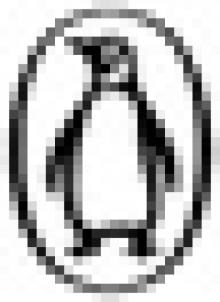 My Family and Other Animals
My Family and Other Animals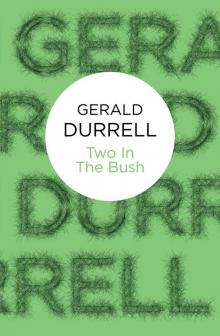 Two in the Bush (Bello)
Two in the Bush (Bello)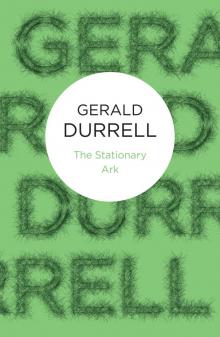 The Stationary Ark
The Stationary Ark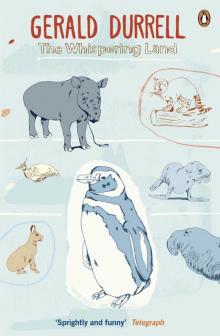 The Whispering Land
The Whispering Land Three Singles to Adventure
Three Singles to Adventure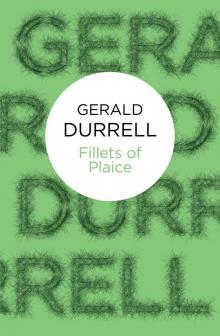 Fillets of Plaice
Fillets of Plaice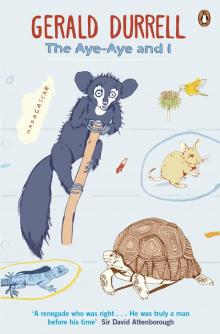 The Aye-Aye and I
The Aye-Aye and I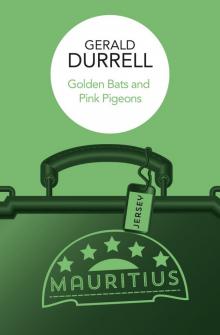 Golden Bats & Pink Pigeons
Golden Bats & Pink Pigeons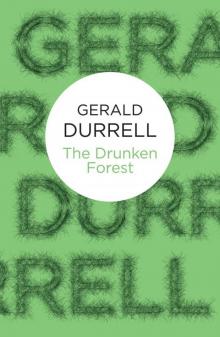 The Drunken Forest
The Drunken Forest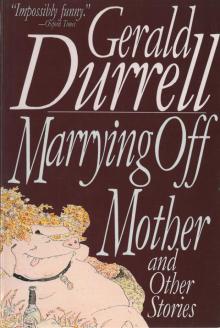 Marrying Off Mother: And Other Stories
Marrying Off Mother: And Other Stories The Corfu Trilogy (the corfu trilogy)
The Corfu Trilogy (the corfu trilogy)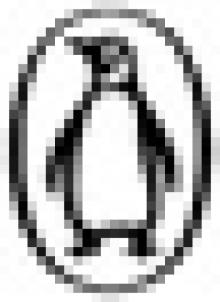 The Corfu Trilogy
The Corfu Trilogy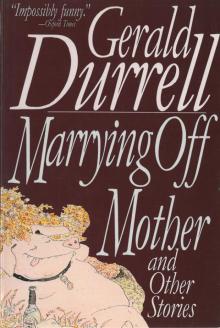 Marrying Off Mother
Marrying Off Mother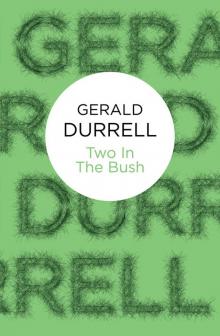 Two in the Bush
Two in the Bush